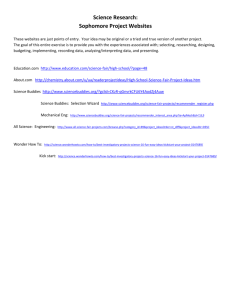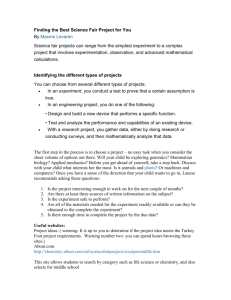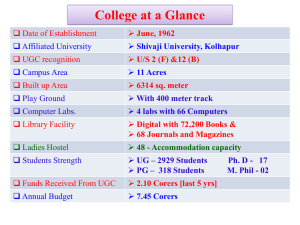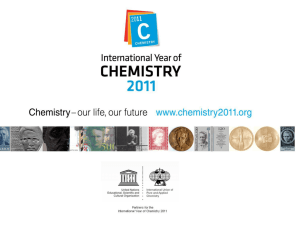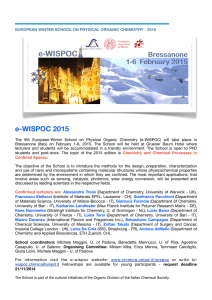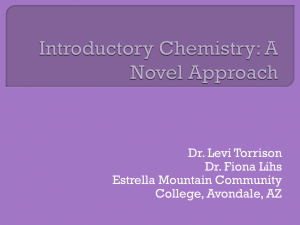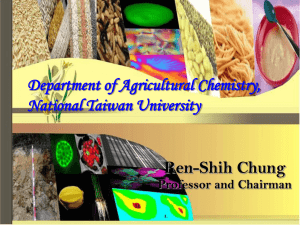Science Fair TopicQuestion
advertisement
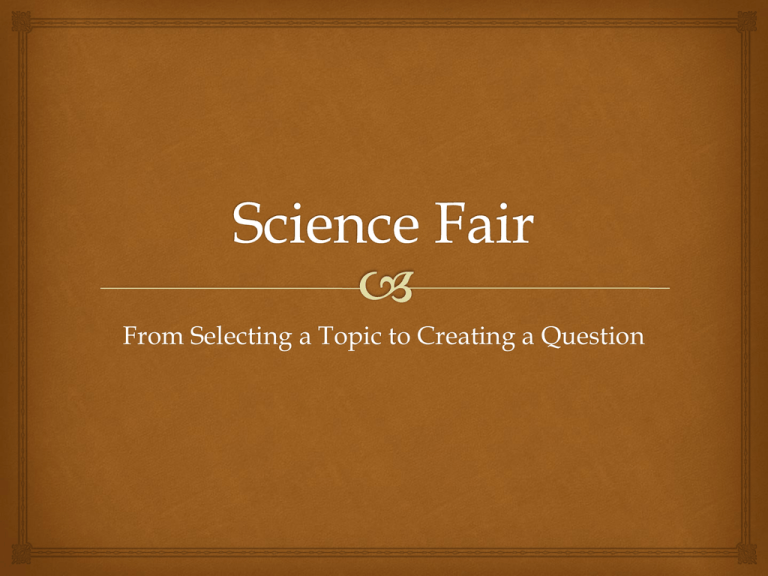
From Selecting a Topic to Creating a Question Ultimate Goals To ask a question and design a way in which to scientifically assess the question To design a model to test the question and describe outcomes To analyze data from multiple trials To evaluate changes to the model (NGSS – Engineering Design) Improve math skills through gathering and analyzing data Improve language arts skills through research and writing technical papers. Improve organization/time management skills by completing a multi step project. Selecting a Topic The most important part of the Science Fair! Pick a topic that INTERESTS you. Pick a topic that is NEW not something you have seen a lot of. Pick something that is TESTABLE. Make sure it is REALISTIC (you will have until Oct. 21st to complete your experiment. Make sure YOU HAVE THE RESOURCES. Restrictions Mentos and Soda Popcorn popping Food that molds Models (creating a model of the solar system, volcano, water cycle, etc.) Can not harm animals or people – including ingesting of chemicals, physical, or mental harm. Fire Categories to Enter Behavioral/Social Science Biochemistry Botany Chemistry Consumer Science Engineering Earth Science Math/Computer Science Space Science Environmental Science Physics Zoology Behavioral/Social Science The science of human activities including: economics, sociology, education, linguistics, anthropology, etc. • • • • • The effects of gender on short term memory. The effects of color on word identification. The effects of type of light on number of blinks. Can ants tunnel faster in wet or dry soil? Does laughter effect blood pressure? Find others at: http://www.crystal-clear-science-fair-projects.com/behavioralscience-fair-project-ideas.html Biochemistry The science of the chemical processes of living including: Genetics, Nutrition, Photosynthesis, Molecular Biology, etc. The effects of sugar on cell volume. The effects of fat content on number of calories. What type of fruit/vegetable contains the most DNA? How does temperature effect the amount of DNA in a substance? Find more examples: http://www.juliantrubin.com/biochemistryprojects.html Botany The science of plants including: Agriculture, Horticulture, Forestry, Mycology, etc. The effect of light concentration on mold growth. Do plants grow better in water or soil? What is the effect of temperature on root growth? Does crowding effect plant growth? Find more at: http://www.sciencemadesimple.com/botany_plant_project s.html Chemistry The science of the properties, compositions and reactions of matter including: organic chemistry, inorganic chemistry, physical chemistry, fuels, materials, etc. Does temperature effect the growth of crystals? Does sugar or salt create the largest crystal? The effect of temperature on the pH of Orange Juice. Which substance melts ice faster? What substance is most corrosive? More examples can be found at: http://www.1000sciencefairprojects.com/Chemistry/BoilingPoint.php Consumer Science Consumer science is the field of knowledge about how the interactions of consumers, business and government correlate and how that interaction affects the well being of all concerned. Comparing two or more products (for pH, viscosity, amount of chemicals, etc.) What kind of laundry soap works best? What type of toilet paper is the strongest? http://www.ehow.com/list_5903664_consumer-scienceproject-fair-ideas.html Engineering The application of scientific knowledge for practical use. Examples: civil, electrical, chemical, mechanical and petroleum engineering How do different materials react to static electricity? Comparing nonrenewable to renewable sources Which type of nails are the strongest? Can suspension bridges hold more weight than a beam bridge? http://www.sciencebuddies.org/science-fairprojects/recommender_interest_area.php?ia=ApMech,CE,EnvE ng&p=9&x=iaRobotics,0,0 Earth Science The understanding of processes that regulate Earth (water cycle, rock cycle, etc.) Examples: geology, seismology, physical oceanography, meterology What type of solution makes the longest crystal? Does soil type effect the quality of a cast fossil? Which types of soil hold the most water? http://www.sciencebuddies.org/science-fairprojects/recommender_interest_area.php?ia=Geo&p=7 Math The study and application of the logical relations of sets. Examples: arithmetic, algebra, geometry, statistics, operations research, calculus. Probability of drawing cards Geometry of candy What’s the fastest way to solve a rubrics cube? http://www.sciencebuddies.org/science-fairprojects/search.shtml?v=ia&ia=Math&p=3 Computer Science The study of computers including their use, operation and design. Examples: software development, computer engineering, artificial intelligence, simulations, graphics Investigate the connection between compouter use and having a dry eye. Find out which file format (TIFF, GIF, JPEG) has the best image quality Computer vs. Human: Exploring AI in the Game Blokus http://www.juliantrubin.com/fairprojects/computers/computers.html Space Science The science of the universe: Astronomy, Astro-physics How does the rotation of a planet correlate to its surface temperature? What direction should solar panels face? Do lunar cycles affect human behavior? http://www.juliantrubin.com/astronomyprojects.ht ml Environmental Science The study of the conditions that influence life on earth. Examples: pollution, population growth, extinction of species, depletion of vital resources, climate changes Which type of class produces the most pollution? Which type of vehicle has the most pollution? Which type of ant builds the thickest tunnels? How do plants grow in different soils? http://www.sciencebuddies.org/science-fairprojects/search.shtml?v=ia&ia=EnvSci&p=4 Physics The science of energy and matter and the interactions between the two. Physics includes the study of material and energy as related to motions, heat, light, and force. What type of surface creates the most friction? Which type of lever uses the least force? What type of paper (bridge) will hold the most weight? http://www.sciencefairadventure.com/Physics.aspx Zoology The science of animals. Examples: ornithology (birds), herpetology (reptiles and amphibians), Mammalogy (mammals), ichthyology (Fish), entomology (insects) The Relationship between the Number of Days it Takes Fruit Flies to Hatch and the Amount of Light to which they are exposed Can the Heartbeat of a Chicken Embryo Be Detected without Breaking its Eggshell? What temperature does the most fish hatch at? Are more grasshoppers found in grass or tree areas? http://www.sciencefairexperiments.org/Zoology/ZoologyProjects.php Question Once you have decided on a topic then you need to create a general question to answer. There can not be any pronouns in your question. The question needs to be testable This needs to include your independent variable For example my topic is Speed My question could be: Does height affect the speed of a ball?
